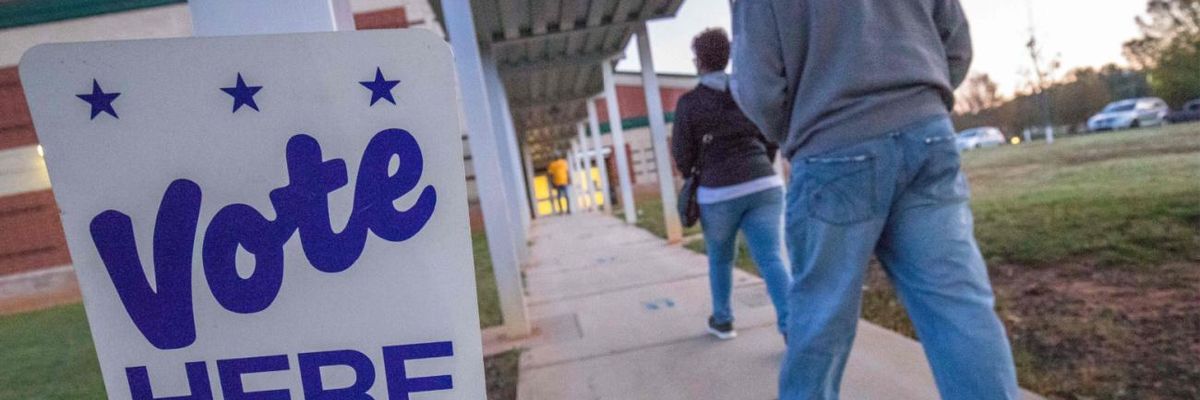
Voters arrive at Waddell Language Academy in Charlotte, North Carolina shortly after the polls opened on November 3, 2020. A state court on Monday ordered election officials to restore voting rights to about 56,000 formerly incarcerated people. (Photo: Grant Baldwin / AFP via Getty Images)
'Incredible': Court Restores Voting Rights for 55K Former Felons in North Carolina
While GOP lawmakers ready an appeal, voting rights advocates move to ensure formerly incarcerated people know about the ruling.
Voting rights advocates in North Carolina on Tuesday applauded a ruling by a panel of three state Superior Court judges for taking "the first step" in restoring justice to tens of thousands of formerly incarcerated people convicted of felonies in the state.
"If the North Carolina courts are expanding voting rights by removing felony disenfranchisement, I can't imagine they will allow a Republican gerrymander."
--Michael McDonald, University of Florida
A panel of the Superior Court voted 2-1 to restore voting rights to about 55,000 people who have been incarcerated for felonies in a decision that would terminate a state law which bars people from voting if they are still on probation, parole, or serving a suspended sentence.
\u201cYesterday was the first step in restoring the voice of those silenced.\n\nWhen harmful laws are enacted that bar formerly incarcerated individuals from exercising their voting rights, it is a subconscious yet calculated act of stripping one of their personal power and identity.\u201d— Forward Justice (@Forward Justice) 1629823943
\u201cThis is incredible news: Effective immediately, North Carolina can no longer disenfranchise people who are on parole or probation for a felony conviction.\n\nThat is more than 55,000 people. https://t.co/AzWyeDalTI\u201d— ACLU (@ACLU) 1629746517
\u201cThis is great news for North Carolina\n\nThe NC legislature should probably take heed that the North Carolina courts will not tolerate gerrymandering https://t.co/4i2u0nyRtk\u201d— Michael McDonald (@Michael McDonald) 1629732642
An Urgent Message From Our Co-Founder
Dear Common Dreams reader, The U.S. is on a fast track to authoritarianism like nothing I've ever seen. Meanwhile, corporate news outlets are utterly capitulating to Trump, twisting their coverage to avoid drawing his ire while lining up to stuff cash in his pockets. That's why I believe that Common Dreams is doing the best and most consequential reporting that we've ever done. Our small but mighty team is a progressive reporting powerhouse, covering the news every day that the corporate media never will. Our mission has always been simple: To inform. To inspire. And to ignite change for the common good. Now here's the key piece that I want all our readers to understand: None of this would be possible without your financial support. That's not just some fundraising cliche. It's the absolute and literal truth. We don't accept corporate advertising and never will. We don't have a paywall because we don't think people should be blocked from critical news based on their ability to pay. Everything we do is funded by the donations of readers like you. Will you donate now to help power the nonprofit, independent reporting of Common Dreams? Thank you for being a vital member of our community. Together, we can keep independent journalism alive when it’s needed most. - Craig Brown, Co-founder |
Voting rights advocates in North Carolina on Tuesday applauded a ruling by a panel of three state Superior Court judges for taking "the first step" in restoring justice to tens of thousands of formerly incarcerated people convicted of felonies in the state.
"If the North Carolina courts are expanding voting rights by removing felony disenfranchisement, I can't imagine they will allow a Republican gerrymander."
--Michael McDonald, University of Florida
A panel of the Superior Court voted 2-1 to restore voting rights to about 55,000 people who have been incarcerated for felonies in a decision that would terminate a state law which bars people from voting if they are still on probation, parole, or serving a suspended sentence.
\u201cYesterday was the first step in restoring the voice of those silenced.\n\nWhen harmful laws are enacted that bar formerly incarcerated individuals from exercising their voting rights, it is a subconscious yet calculated act of stripping one of their personal power and identity.\u201d— Forward Justice (@Forward Justice) 1629823943
\u201cThis is incredible news: Effective immediately, North Carolina can no longer disenfranchise people who are on parole or probation for a felony conviction.\n\nThat is more than 55,000 people. https://t.co/AzWyeDalTI\u201d— ACLU (@ACLU) 1629746517
\u201cThis is great news for North Carolina\n\nThe NC legislature should probably take heed that the North Carolina courts will not tolerate gerrymandering https://t.co/4i2u0nyRtk\u201d— Michael McDonald (@Michael McDonald) 1629732642
Voting rights advocates in North Carolina on Tuesday applauded a ruling by a panel of three state Superior Court judges for taking "the first step" in restoring justice to tens of thousands of formerly incarcerated people convicted of felonies in the state.
"If the North Carolina courts are expanding voting rights by removing felony disenfranchisement, I can't imagine they will allow a Republican gerrymander."
--Michael McDonald, University of Florida
A panel of the Superior Court voted 2-1 to restore voting rights to about 55,000 people who have been incarcerated for felonies in a decision that would terminate a state law which bars people from voting if they are still on probation, parole, or serving a suspended sentence.
\u201cYesterday was the first step in restoring the voice of those silenced.\n\nWhen harmful laws are enacted that bar formerly incarcerated individuals from exercising their voting rights, it is a subconscious yet calculated act of stripping one of their personal power and identity.\u201d— Forward Justice (@Forward Justice) 1629823943
\u201cThis is incredible news: Effective immediately, North Carolina can no longer disenfranchise people who are on parole or probation for a felony conviction.\n\nThat is more than 55,000 people. https://t.co/AzWyeDalTI\u201d— ACLU (@ACLU) 1629746517
\u201cThis is great news for North Carolina\n\nThe NC legislature should probably take heed that the North Carolina courts will not tolerate gerrymandering https://t.co/4i2u0nyRtk\u201d— Michael McDonald (@Michael McDonald) 1629732642

